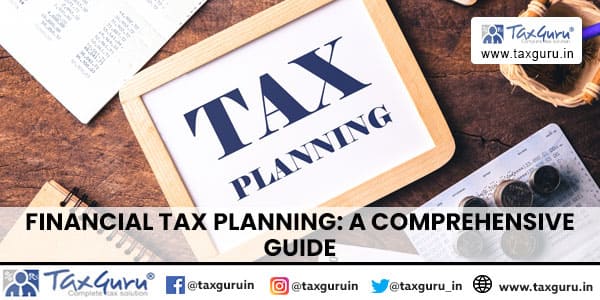Introduction:
Financial tax planning is a crucial aspect of personal and business finance management. Whether you’re an individual taxpayer or a business owner, understanding tax laws and implementing effective tax strategies can significantly impact your financial well-being. In this comprehensive guide, we’ll explore the importance of financial tax planning, key strategies to minimize tax liabilities, and how to optimize your financial position while staying compliant with tax regulations.
Why Financial Tax Planning Matters:
Tax planning is not merely about complying with legal obligations; it’s about strategically managing your finances to minimize tax liabilities and maximize wealth accumulation. Effective tax planning can help individuals and businesses:
1. Maximize Tax Efficiency: By strategically structuring financial transactions and investments, you can reduce the amount of tax you owe, allowing you to keep more of your hard-earned money.
2. Plan for the Future: Tax planning involves forecasting future income and expenses to anticipate tax liabilities accurately. This foresight enables individuals and businesses to make informed financial decisions and allocate resources efficiently.
3. Enhance Cash Flow: By optimizing tax deductions, credits, and deferrals, tax planning can improve cash flow, providing individuals and businesses with more liquidity to pursue investment opportunities or meet financial obligations.
4. Achieve Long-Term Financial Goals: Whether it’s saving for retirement, funding education, or expanding a business, tax planning plays a crucial role in achieving long-term financial objectives by minimizing tax burdens and maximizing savings.

Key Strategies in Financial Tax Planning:
Effective tax planning involves a combination of proactive strategies tailored to individual or business circumstances. Some key strategies include:
1. Income Deferral and Acceleration: Timing income and expenses can significantly impact tax liabilities. Deferring income to future years or accelerating deductions into the current year can help manage taxable income effectively.
2. Maximizing Deductions and Credits: Take advantage of available deductions and tax credits to minimize taxable income. This includes deductions for charitable contributions, mortgage interest, education expenses, and various business expenses.
3. Investment Planning: Choose tax-efficient investment strategies such as investing in retirement accounts (e.g., 401(k), IRA), tax-exempt municipal bonds, or capital gains deferral through tax-loss harvesting.
4. Entity Structure Optimization: For business owners, selecting the right legal structure (e.g., sole proprietorship, partnership, corporation) can impact tax obligations significantly. Each entity type has its own tax implications, so it’s essential to choose wisely based on factors such as liability protection, tax treatment, and operational flexibility.
5. Estate Planning: Implementing estate planning strategies can minimize estate taxes and ensure smooth wealth transfer to heirs. Techniques such as gifting, trusts, and life insurance can help preserve assets and minimize tax consequences upon transfer.
6. Tax Law Compliance and Updates: Stay informed about changes in tax laws and regulations to ensure compliance and identify new opportunities for tax optimization. Consulting with tax professionals or financial advisors can provide valuable insights into navigating complex tax landscapes.
Conclusion:
Financial tax planning is a fundamental aspect of prudent financial management for individuals and businesses alike. By implementing strategic tax planning techniques, you can minimize tax liabilities, optimize financial resources, and achieve long-term financial goals. Whether it’s through income deferral, maximizing deductions, or entity structure optimization, proactive tax planning can pave the way for financial success and security. Stay informed, seek professional guidance when needed, and make tax planning an integral part of your overall financial strategy.





